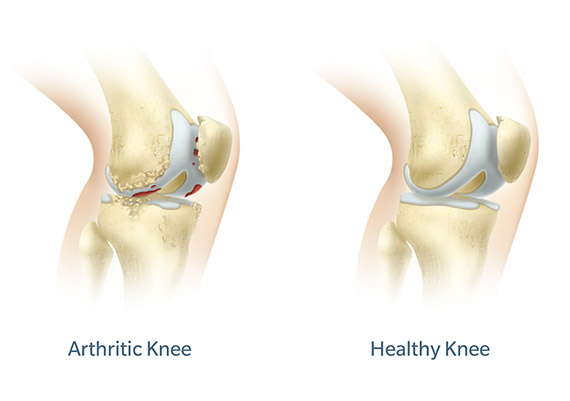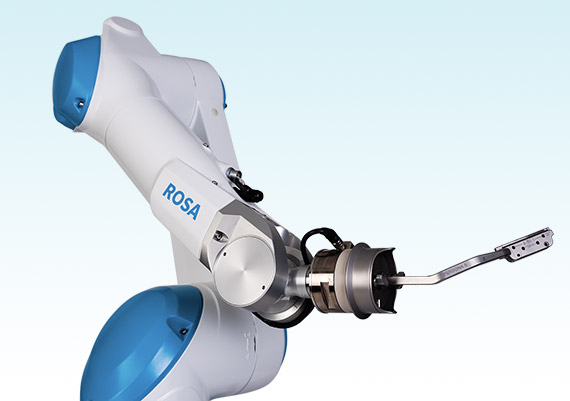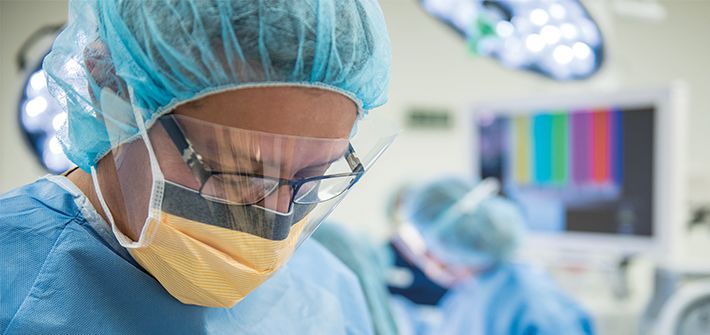Arthritis in the knee joint
Osteoarthritis, the most common form of arthritis, is a wear-and-tear condition that destroys joint cartilage and bone. It typically develops after years of constant motion and pressure in the joints. As the cartilage continues to wear away, the joint becomes increasingly painful and difficult to move. If conservative treatment options fail to provide relief, your surgeon may recommend total knee replacement using ROSA Knee robotic technology.

A personalized approach just for you
You’re unique, and so is your individual anatomy. Spartanburg Surgery Center is excited to offer Zimmer Biomet’s ROSA® Knee robotic technology to better serve our community.
ROSA stands for Robotic Surgical Assistant. Our specially trained surgeons use this technology and Zimmer Biomet’s industry-leading knee implants to personalize surgical procedures for their patients.

A precise knee implant fit is important to your comfort and overall experience following knee replacement surgery. ROSA knee uses data collected before and during surgery to inform your surgeon of details related to your unique anatomy that may affect the fit of your implant. This allows your surgeon to plan and execute a surgery based on your individual needs.
Before surgery
Your preoperative experience will be like that of most total knee patients. But, unlike traditional knee replacement methods, with ROSA Knee, a series of x-rays may be used to create a three-dimensional (3D) model of your knee anatomy. This 3D model will enable the surgeon to plan many specifics of your knee replacement prior to your surgery.
During surgery
Your surgeon has been specially trained to use ROSA Knee in order to personalize the surgical approach for your unique anatomy. Your surgeon is in full command and control of the procedure and is making all the decisions throughout your surgery. The robot does not operate on its own and will not move unless your surgeon prompts it to.
After surgery
Recovery time varies but is generally quick as it is a minimally invasive procedure. You may notice some stiffness and pain in your leg after surgery. Medications will be prescribed to manage this discomfort. Instructions on surgical site care, rehabilitation exercises, driving, and bathing will be provided to you by your surgeon. You should be able to resume most of your normal activities in a couple weeks following surgery.
Risks and Complications
ROSA® robotic total knee replacement is a relatively safe procedure; however, as with any surgery, there are risks and complications that can occur, such as:
- Pain
- Bleeding
- Infection
- Damage to surrounding soft tissues
- Stiffness or instability in the knee
No implant lasts forever, and factors such as your post-surgery activities and weight can decrease the length of time it will be effective. Be sure to discuss these and other risks with your surgeon.
Summary
The decision to have surgery is sometimes difficult. We hope that this information has helped you understand the ROSA Knee System so that you can make the best decision for yourself. This information is not intended to replace the experience and counsel of your orthopedic surgeon. To see if you are a candidate for ROSA, please contact Dr. Gerscovich, Dr. Funderburk or Dr. Rollins with Carolina Orthopaedic and Neurosurgical Associates (CONA).
